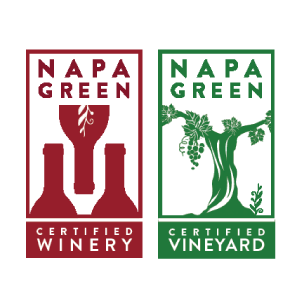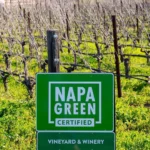Despite diametrically opposed studies on its safety, Napa Green recently announced that it will require members to phase out the use of Roundup and other synthetic herbicides by 2026 and 2028, respectively.
Napa Green to hold town hall following announcement of Roundup ban
-
 Katie DeBenedetti | napa valley register
Katie DeBenedetti | napa valley register
- |
On Thursday, the nonprofit focusing on vineyard and winery sustainability will hold a town hall and panel with industry experts to discuss the decision to move toward herbicide-free weed management practices in the coming years.
“We are the first program globally to redevelop our vineyard standards to focus on climate action and regenerative farming and social equity. We set an incredibly high bar,” executive director Anna Brittain said.
In 2021, the nonprofit convened a Pesticide Working Group to revise its Vineyard Certification Standards, she said. At the time, the organization chose not to require that vineyards be herbicide-free, but they did designate a new “gold level” standard specifically for organic and herbicide-free growers.
It also introduced requirements for all growers to limit herbicide use. Brittain said the new standards called on growers to lower herbicide use by 5% each year, and limit when and where they applied herbicides to limit runoff potential.
The working group has continued to meet biannually in the two years since the revision, and this year the group reached a majority conclusion that synthetic herbicides needed to be phased out. This will begin with Roundup, but in 2028, it will also include common alternatives like Lifeline and Finale XL, which uses glufosinate-ammonium as its active ingredient.
Brittain said that this decision was not an easy one. Getting rid of herbicides requires a “systematic change to farming” on the part of growers who have relied on them for weed management. Other methods include more hand weeding, which means more paid hours of manual labor. Alternatively, switching to mechanical methods of weed removal, like tractors and plows, require a fairly large monetary investment, and generally take longer.
Additionally, 37% of Napa Green’s current members — as well as those in the process of getting certification — still use synthetic herbicides, and Brittain believes there is a chance some members will leave the organization with this change.
For Napa Green, the pros outweigh the cons.
Synthetic herbicides are “reducing diversity in the soil, it’s reducing the health of the microbiome, and all the microbes and the fungal networks in the soil when you’re applying this chemical to the soil,” she said. “From a soil health standpoint, we felt that was pretty unequivocal. We’re very focused on regenerative agriculture and it’s hard to say you’re working on regenerative agriculture if you’re not regenerating soil health.”
Adding to the confusion and controversy, two major agencies focused on cancer and health have come to completely different conclusions when it comes to glyphosate.
The substance has been deemed “probably carcinogenic to humans” by the International Agency for Research on Cancer. It has also been linked to the development of non-Hodgkin’s lymphoma after long-term, repeated exposure and threatened species including the monarch butterfly and honeybees, according to Napa Green.
However, the U.S. Environmental Protection Agency has said “there are no risks of concern to human health when glyphosate is used in accordance with its current label. EPA also found that glyphosate is unlikely to be a human carcinogen.”
And Bayer, the current producer of Roundup (which was brought to market by Monsanto in 1974), states that the product can be used safely.
“Glyphosate and Roundup are among the most thoroughly studied products of their kind, which is a major reason why farmers around the world continue to rely on these products,” a Bayer spokesperson said via email. “For 50 years, leading health regulators around the world have repeatedly concluded that glyphosate-based products like Roundup can be used safely as directed.”
Molly Hodgins, a viticulture professor at Napa Valley College, said that whether or not growers should move away from herbicides entirely isn’t clear.
“I think it’s a tough call,” Hodgins said. “The soil is generally healthier when it’s kept in an organic state, which is having weeds. There’s more organic matter in a soil that is allowed to have weeds grow. But managing undervine weeds with mowing is more expensive and it is more work, so I think there is room for some herbicides in a sustainable program.”
But worries about the health effects of Roundup and other herbicides like it are why Randle Johnson, a longtime Napa grape grower, decided to stop using all weed killers in 2019.
He’s been a winemaker in Napa for almost 50 years, and remembers when Roundup was first introduced to growers.
“I was around when Roundup hit the market and it was viewed as a silver bullet. People cheered and clapped,” he said. “At the very beginning, it was felt that it was so benign you could ingest it.”
He used Roundup in the vineyards he worked in until 2018, when he stumbled upon a medical infomercial warning of the herbicide’s negative effects.
“I quit using Roundup in my own vineyard three to four years ago,” Johnson said. “But when chemicals are phased out, farmers are going to ask, ‘What can I use instead?’”
There are mechanical methods that vineyards can use, like the French Plow and other tractors, to take out weeds between vines. Johnson also said that hand-farming is an option. But for him, both of these methods turned out to be a lot more expensive and time-consuming than using herbicides.
Brittain said that Napa Green is planning to provide at least two training workshops during the first quarter of 2024 to teach members about non-herbicide weed management options.
The nonprofit has also raised $60,000 to match funds for members’ sustainability and climate action efforts. Brittain said that growers making changes to phase out herbicides will be able to apply for those funds in the new year.
For a small number of vineyards that are unable to entirely phase out herbicides, Brittain said that some variances might be granted. The idea of variances has been controversial among Napans, but Brittain said that the number of these exceptions will be small.
“There’s been a take of like, ‘You’re just going to give anyone a pass,’ which is not going to be the case,” Brittain said. “Those variances are going to be very limited.”
“This industry is extremely narrow margins and we do anticipate there will probably be a handful of growers where they really can show, ‘With my level of slopes and terraces or the amount of rocks in my soil, there isn’t other equipment I can use,’ or ‘The labor is really absolutely cost-prohibitive,’ and we’re going to be looking at that very carefully,” she continued.
She said that a peer-review committee will be assembled to assess these variance requests on a case-by-case basis. The committee will likely include Napa Green’s vineyard program manager along with volunteers, both from vineyards that do use herbicides and those that do not.
Brittain said case studies conducted by Napa Green, available in the group’s weed management toolkit, show that over time, moving away from herbicides can reduce expenditures, and sometimes lead to a premium on the price of grapes in the long run.
At Thursday evening’s town hall, she expects the majority of the conversation to revolve around how to make the transition period manageable for current and potential new members of Napa Green.
The event will take place from 4:30 to 6:30 p.m. at St. Supéry Estate Vineyards & Winery, at 8440 St. Helena Highway (Highway 29) in Rutherford. To RSVP, visit napagreen.org/toolkit.
For this reason, back in 2021 Napa Green established the “Six Pillars of Sustainable Winegrowing Leadership.” The Six Pillars are: I. Water Efficiency & Savings; II. Energy Efficiency & Savings; III. Waste Prevention & Supply Chain; IV. Proactive Farming, Soil Health & Biodiversity; V. Social Justice, Diversity & Inclusion; all under the umbrella of VI. Climate Action & Regenerative Agriculture. Essentially, Napa Green has created two intersecting leadership roadmaps that encompass these Six Pillars, with >100 leading Vineyard practices, and >120 leading Winery practices that growers and vintners have to implement (and be third-party audited) to swing that green metal sign.
Napa Green emphatically believes that a whole-systems approach from the farm, through production, to the people that make it all possible, is critical to meaningful climate action and impact. We see the Six Pillars as a filter that can be used to evaluate any business or organizational claims of sustainability and ask, “Are they really leaders? Are they really taking a whole-systems approach?”
You Mean Organic?
When we talk about sustainable farming or agriculture most people think of organic farming. We will delve into this in more detail in another feature, but if you think about the Six Pillars and a whole-systems approach, not using synthetic pesticides or herbicides, while valuable, is just one small piece of a much bigger puzzle. In terms of environmental stewardship, organic only relates to farming, and focuses on a narrow “don’t,” without addressing broader “dos” of resource use efficiency, climate action, and social equity. Napa Green Vineyard certification includes Prohibited & Restricted Pesticides, including a requirement that members phaseout Roundup/glyphosate-based products by January 1, 2026, and all synthetic herbicides by January 1, 2028, but again this is only one of six elements that certified growers have to address.
What is Climate Action?
Climate action refers to choices that reduce emissions (like using less energy and fuel), drawdown or sequester/store carbon (like compost and cover crops), and cultivate healthy ecosystems more resilient to weather extremes including drought, high heat, and atmospheric rivers. Almost all Napa Green certification standards relate to climate action.
For instance, the Napa Green “Social Justice, Diversity & Inclusion” standards include living wage, benefits, education and opportunities for advancement to help ensure that employees feel safe, secure, and listened to. This is foundational to building engaged and empowered teams that contribute to growing climate-smart businesses.
Napa Green growers implement “Carbon Farm Plans,” custom-developed for them by the Napa Green vineyard team. These plans layout opportunities to build soil health, store carbon, and cultivate more resilient vineyards such as reduced tillage/tractor passes, expanded cover crops that can attract beneficial insects, reduced fertilizer use, planting hedgerows that can provide habitat for natural predators like bluebirds and raptors, bringing in sheep as natural lawnmowers and fertilizers.
Napa Green vintners reduce water use, which reduces the energy needed to transport, heat and treat that water, which reduces emissions. They also “green” their packaging, such as eliminating Styrofoam and opportunities like lightening glass bottles (reduced emissions to manufacture and transport), shifting from wood boxes to lighter and recyclable cardboard, and using natural corks instead of non-recyclable screwcaps and plastic closures.
This is a quick introduction to the Napa Green Vineyard and Winery certifications. We look forward to sharing more and spotlighting leadership stories in these monthly features. Here are a few testimonials from our members about what they get out of being Napa Green:
To see a full list of members visit: napagreen.org/participating-members
About napa green
About Napa Green: The Napa Green 501c3 is a global leader in sustainable winegrowing, setting the highest bar for sustainability and climate action in the wine industry. Napa Green facilitates whole system soil to bottle certification for wineries and vineyards, and provides the expertise, boots-on-the-ground support, and resources to continually improve. Learn more at https://napagreen.org/participating-members/.
Anna Brittain
Napa Green
+1 805-636-3329
email us here
Visit us on social media:
Facebook
LinkedIn
Instagram



